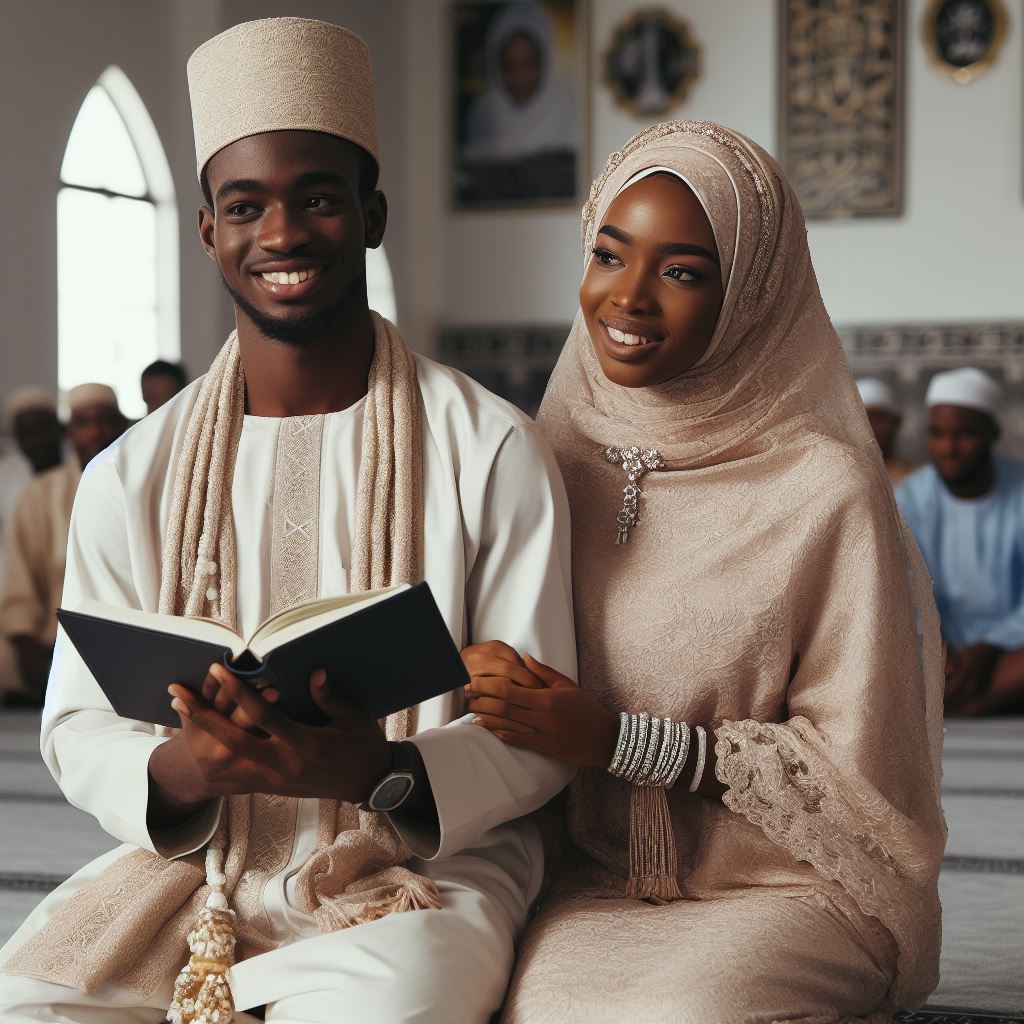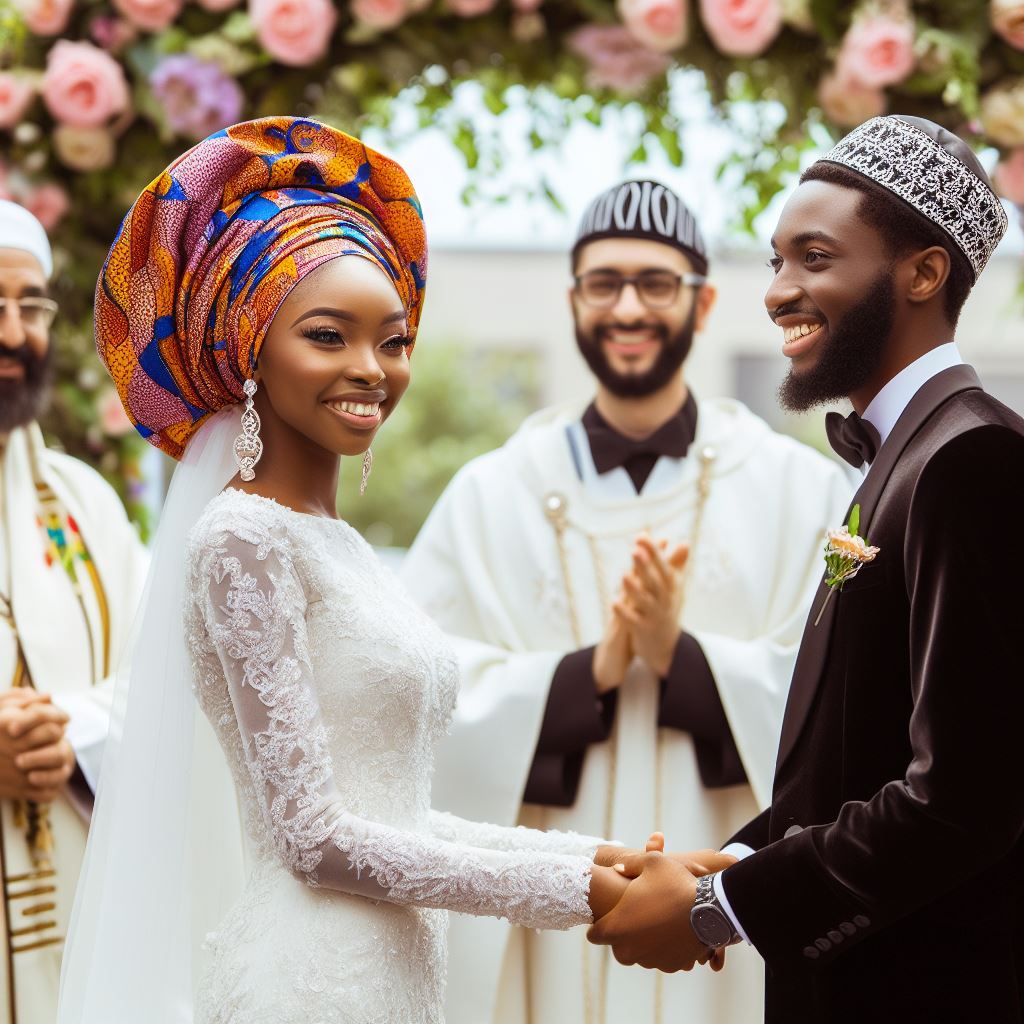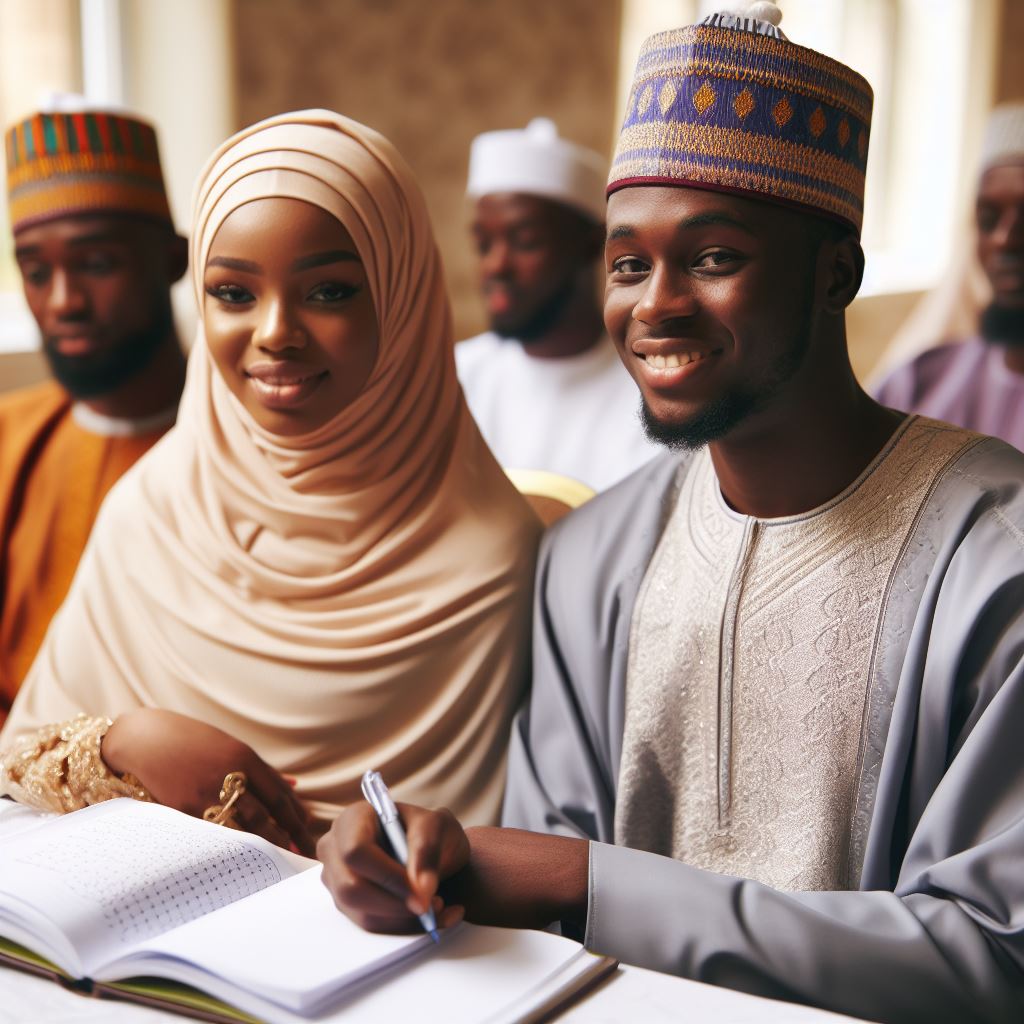Introduction
Welcome to a deep dive into the timeless wisdom of Hadiths, shedding light on the intricacies of marriage.
In Nigerian society, marriage is not merely a union of two souls but a tapestry weaving together families and communities.
It is the cornerstone of our culture, where traditions and customs find their true meaning.
Importance of Marriage in Nigerian Society
Marriage is the nucleus of Nigerian society, symbolizing unity, love, and continuity.
It’s a pivotal rite of passage, celebrated with grandeur, where two individuals embark on a journey together, carrying the hopes and dreams of their families.
It’s a celebration of love and culture, with each ethnic group adding its unique flavors to the ceremony.
Relevance of the Hadiths in Islamic Tradition
Islamic traditions, conveyed through Hadiths, are the guiding stars illuminating this path of marital bliss.
These sacred teachings offer invaluable insights, from selecting the right partner to navigating the complexities of married life.
In the rich tapestry of Nigerian culture, where the majority of the population practices Islam, these Hadiths are not just words from the past but living principles that shape marital unions.
As we explore the Hadiths and their relevance to Nigerian society, we’ll uncover the profound impact they have on our most cherished institution – marriage.
Join us on this enlightening journey through the wisdom of Hadiths, as we seek to strengthen the bonds that form the foundation of our lives.
The Prophetic Tradition and Its Significance
What Hadiths are
- Hadiths are the sayings, actions, and approvals of Prophet Muhammad, collected and compiled by his companions.
- They provide guidance on various aspects of life, including marriage.
- Hadiths consist of two components: the matn (the content) and the isnad (the chain of narrators).
- They are classified into different categories based on their authenticity.
Role of Hadiths in shaping Islamic teachings
- Hadiths complement the Quran in providing guidance for Muslims.
- They explain and elaborate on the principles and teachings of Islam.
- Hadiths are considered a primary source of Islamic law (Sharia).
- They help in understanding the context of Quranic verses and their application in daily life.
Importance of following the Prophetic Tradition in marriage decisions
- Prophet Muhammad’s exemplary character and teachings serve as a role model for Muslims.
- His actions and sayings regarding marriage provide guidance and wisdom.
- By following his example, Muslims can develop successful and harmonious marriages.
- The Prophetic Tradition highlights the importance of love, respect, and communication in marriage.
- It emphasizes the mutual rights and responsibilities of spouses, promoting equality and fairness.
- Marrying within the boundaries set by the Prophetic Tradition ensures compatibility and shared values.
Basically, Hadiths play a crucial role in shaping Islamic teachings, including guidance for marriage decisions.
They provide a comprehensive understanding of Prophet Muhammad’s actions and sayings, serving as a role model for Muslims.
By following the Prophetic Tradition in marriage, individuals can establish strong and fulfilling relationships based on love, respect, and mutual understanding.
Read: Nikah Khutbah: Significance and Common Practices in Nigeria
Building a Strong Foundation: Selecting a Suitable Partner
A successful and fulfilling marriage begins with choosing the right partner. Islam, with its emphasis on compatibility and shared values, provides valuable guidance in this regard.
The prophetic tradition offers enlightening Hadiths that underscore the importance of selecting a suitable spouse.
Hadiths Emphasizing the Importance of Compatibility
- “A believer is not compatible with an unbeliever.” This Hadith highlights the significance of choosing a partner who shares your faith.
- “A woman may be married for four reasons: her wealth, her beauty, her lineage, and her faith. Choose the one who is faithful.” This Hadith encourages prioritizing faith when selecting a spouse.
- “A man’s true wealth is his good character.” This Hadith emphasizes the importance of finding a partner with virtuous qualities and moral values.
- “Choose the compatible match for your children to avoid corruption on earth.” This Hadith underscores the role of compatibility in maintaining a harmonious family life.
Guidance Regarding the Criteria for Choosing a Spouse
- Character: The Prophet Muhammad (peace be upon him) advised his followers to give importance to a person’s character when considering them as a potential spouse.
- Religious Devotion: Islam places great emphasis on faith and religious practice, making it crucial to choose a partner who shares your religious convictions and commitment.
- Family Background: The Prophet Muhammad (peace be upon him) encouraged considering a person’s family background, including their lineage and upbringing, as it can significantly impact a person’s character.
- Compatibility: The Hadiths stress the importance of compatibility in terms of temperament, interests, and goals to ensure a harmonious and fulfilling marital relationship.
- Physical Attraction: While beauty is not the sole criterion, the Prophet Muhammad (peace be upon him) acknowledged the natural human inclination towards physical attractiveness when considering a spouse.
- Ethical Conduct: The Hadiths emphasize the importance of choosing a partner who possesses good manners, integrity, and honesty.
Importance of Shared Values, Character, and Faith
Selecting a partner who shares your values, character, and faith provides a strong foundation for a successful marriage.
Shared values enable couples to navigate challenges and make important decisions collectively.
Having similar character traits promotes mutual understanding, empathy, and cooperation.
Moreover, shared faith creates an essential bond that strengthens the marriage through shared rituals, spiritual growth, and a joint pursuit of righteousness.
When choosing a spouse, it is vital to prioritize these aspects over superficial factors like wealth or physical appearance.
The prophetic tradition reminds believers that a successful marriage is built on the foundation of compatibility, shared values, character, and faith.
By adhering to these principles, couples can lay the groundwork for a robust and enduring partnership.
The Hadiths provide valuable guidance for selecting a suitable partner, emphasizing compatibility, shared values, character, and faith.
By following these teachings, individuals can ensure a strong foundation for their marriage, leading to a fulfilling and harmonious relationship.
Read: Choosing a Spouse in Islam: Criteria and Nigerian Context
Emphasizing Mutual Love and Respect
Hadiths highlighting the Prophet’s emphasis on love and kindness
- Prophet Muhammad encouraged believers to express their love and affection towards their spouses.
- In a hadith, he stated, “The best of you are those who are best to their wives.”
- This highlights the Prophet’s emphasis on the importance of love and kindness within a marital relationship.
- He expressed his love for his wives through words and actions, setting an example for his followers.
- His teachings encourage spouses to always find ways to express love and affection towards each other.
Importance of treating one’s spouse with respect and fairness
- The Prophet emphasized the importance of treating one’s spouse with respect and fairness.
- He stated, “The most perfect believer in faith is the one who has the best behavior, and the best of you are those who are best to their wives.”
- This hadith highlights the significance of treating one’s spouse with kindness and fairness.
- It reminds believers that their behavior towards their spouse reflects their level of faith and piety.
- Treating one’s spouse with respect and fairness contributes to a harmonious and successful marriage.
Encouragement to foster love and harmony in marriage
- Hadiths emphasize the importance of fostering love and harmony within the marital relationship.
- Prophet Muhammad stated, “When a husband and wife look at each other with love, Allah looks at them with mercy.”
- This hadith highlights the positive impact of love and affection in a marriage.
- It encourages spouses to cultivate love, compassion, and understanding towards each other.
- Fostering love and harmony in marriage leads to a strong bond and a successful partnership.
Essentially, the prophetic tradition highlights the significance of mutual love and respect in a marital relationship.
The hadiths emphasize the Prophet’s emphasis on love and kindness, encouraging believers to express their affection towards their spouses.
Additionally, the importance of treating one’s spouse with respect and fairness is emphasized, reminding believers that their behavior reflects their level of faith.
The hadiths also encourage fostering love and harmony in marriage, highlighting the positive impact it brings.
Read: Celebrating Walimah: The Sunnah of Islamic Wedding Feast
Communication and Conflict Resolution
Hadiths emphasizing the significance of good communication
- The Prophet Muhammad (peace be upon him) said, “The best among you are those who are best in communication with their spouses.”
- Communication is the key to a successful marriage, and the Prophet encouraged believers to engage in open and respectful dialogue.
- The importance of good communication is reiterated in another Hadith: “Among the things which cause happiness in a household is good communication.”
- Clear and effective communication allows couples to understand each other’s needs, resolve conflicts, and strengthen their bond.
- It is essential for spouses to develop active listening skills, be attentive, and show genuine interest in each other’s thoughts and feelings.
Guidance on resolving conflicts in a respectful manner
- Prophetic traditions provide valuable guidance on how to handle conflicts with dignity and respect.
- The Prophet said, “If one of you becomes angry, let him be silent,” emphasizing the need for self-control during heated moments.
- Taking a pause and refraining from speaking impulsively during conflicts allows space for rational thinking and prevents hurtful words.
- The Prophet also advised believers to avoid using harsh language and instead choose kind and gentle words to resolve disagreements.
- Another Hadith highlights the importance of compromise: “Give up your right for the sake of peace.”
Importance of patience and forgiveness in marital relationships
- Patience is a virtue highly emphasized in the prophetic tradition for maintaining a healthy and harmonious marriage.
- The Prophet encouraged believers to exercise patience even in the face of difficulties, as it leads to blessings and rewards.
- In conflicts, spouses should remember the Hadith that states, “A strong person is not the one who overpowers others, but the one who controls themselves during anger.”
- Forgiveness is another essential aspect of conflict resolution in marital relationships.
- The Prophet taught that forgiving each other’s mistakes and shortcomings strengthens love and fosters a peaceful atmosphere at home.
In general, effective communication and conflict resolution play a vital role in maintaining a strong and blissful marital relationship.
The prophetic tradition emphasizes the significance of good communication and active listening.
It encourages using kind and gentle words, avoiding harsh language, and compromising for the sake of peace.
Additionally, patience and forgiveness are essential virtues that contribute to resolving conflicts and nurturing a loving bond.
Incorporating these teachings from Hadiths in our lives can lead to stronger, healthier marriages.
Read: The Concept of Polygamy in Islam: Nigerian Perspectives

Fulfilling Responsibilities: The Roles of Husband and Wife
In the context of marriage, both spouses have specific roles and responsibilities.
Islam provides guidance on fulfilling these responsibilities through various Hadiths.
Understanding and implementing these teachings can lead to a harmonious and successful marriage.
Hadiths outlining the duties and responsibilities of husbands
According to the Prophet Muhammad (peace be upon him), husbands should treat their wives with kindness and respect.
They are responsible for providing for their wives financially, sheltering them, and ensuring their physical and emotional well-being.
One Hadith states, “The best among you are those who are best to their wives.”
This encourages husbands to be loving, compassionate, and understanding towards their spouses.
Another Hadith emphasizes the importance of providing for the family.
The Prophet said, “It is better for one of you to bring a load of firewood on his back and sell it, then to take a handful from it and give it as charity until he becomes self-sufficient, rather than begging people whether they give him or refuse him.”
These teachings highlight the significance of fulfilling financial responsibilities, as well as treating wives with love and compassion.
Hadiths discussing the responsibilities of wives
Wives also have duties and responsibilities towards their husbands.
They are expected to obey their husbands in matters that are permissible in Islam.
This obedience should be based on mutual respect and love.
A Hadith states, “A woman should not fast while her husband is at home, except with his permission.
If she does so, then the angels curse her until she breaks her fast.”
This Hadith emphasizes the importance of maintaining harmony and unity within the marital relationship.
The Prophet advised wives to take care of their homes and be diligent in their household chores.
He said, “Be the best of wives by being good to your husbands and taking care of their needs.”
These teachings encourage wives to prioritize their husband’s happiness and well-being, while also fulfilling their domestic responsibilities.
Importance of equity and balance in fulfilling roles
Islam emphasizes the importance of equity and balance in fulfilling the roles of husband and wife.
Both partners have rights and responsibilities towards each other, and their roles complement one another.
The Prophet Muhammad said, “The believers who show the most perfect faith are those who have the best character and the best of you are those who are best to their wives.”
This Hadith highlights the equal importance of both spouses in maintaining a successful marriage based on mutual respect, love, and compassion.
It is essential for husbands and wives to work together as a team, communicate effectively, and support each other to create a harmonious and balanced marital relationship.
In essence, Islam provides clear guidance on the roles and responsibilities of husbands and wives in marriage through various Hadiths.
Husbands are expected to provide for their wives and treat them with kindness, while wives are expected to obey their husbands and take care of their homes.
However, it is crucial to maintain equity and balance in fulfilling these roles.
By following these teachings, couples can foster a strong and loving relationship, fulfilling their duties towards each other as prescribed by the Prophetic tradition.
Strengthening the Marital Bond: Intimacy and Family Life
Hadiths on the importance of physical intimacy in marriage
- The Prophet Muhammad (peace be upon him) emphasized the significance of physical intimacy in marriage.
- He encouraged spouses to engage in intimate acts, as it strengthens their bond and increases affection.
- The Prophet taught that physical intimacy is not only a means of pleasure but also a way to fulfill each other’s needs.
- He constantly reminded believers that maintaining a healthy and satisfying sexual relationship is crucial for a successful marriage.
- Through his teachings, the Prophet highlighted the importance of open communication and mutual consent in physical intimacy.
Guidance on maintaining a healthy and fulfilling family life
- The Prophet emphasized the importance of kindness, compassion, and understanding towards one’s spouse.
- He taught that a strong and happy family is built on love, respect, and support for one another.
- The Prophet emphasized the significance of spending quality time together as a family.
- He encouraged spouses to engage in activities that promote bonding and strengthen their relationship.
- The Prophet advised believers to express gratitude and appreciation for their partner’s efforts in maintaining the family.
Emphasis on raising children with Islamic values
- The Prophet stressed the responsibility of parents in nurturing and raising children with Islamic values.
- He encouraged parents to instill the love of Allah and His Prophet in their children from an early age.
- The Prophet taught that teaching children about Islam and its principles is a fundamental duty of every Muslim parent.
- He advised parents to be role models by practicing what they preach and demonstrating Islamic values in their own lives.
- The Prophet emphasized the importance of imparting knowledge, wisdom, and moral values to children.
In a nutshell, the prophetic tradition provides valuable lessons on strengthening the marital bond and fostering a healthy family life.
It underscores the importance of physical intimacy in marriage, emphasizing the need for open communication and consent.
The guidance of the Prophet encourages spouses to maintain a loving and supportive environment, spending quality time together as a family.
Additionally, the tradition highlights the role of parents in raising children with Islamic values.
By following these teachings, believers can cultivate fulfilling relationships and create a harmonious family based on love, respect, and Islamic principles.
Learn More: Long-distance Relationships: Staying Connected in Nigeria
Conclusion
Recap of key lessons from Hadiths on marriage
Throughout this blog post, we have explored various Hadiths that provide valuable lessons for a successful and harmonious marital relationship.
We have learned the importance of mutual respect, kindness, and communication in marriage.
The Hadiths teach us to prioritize forgiveness, patience, and understanding to build a strong bond between spouses.
We have also been reminded of the significance of gratitude and gratitude in appreciating each other’s contributions to the relationship.
By following the teachings of the Prophet Muhammad (peace be upon him), we can strive to have a healthy and fulfilling marriage.
Encouragement to incorporate the Prophetic Tradition in marital relationships
It is essential to incorporate the Prophetic Tradition in our marital relationships.
By emulating the Prophet Muhammad (peace be upon him), who exemplified love, compassion, and mercy, we can create a nurturing environment for ourselves and our spouses.
By following his teachings, we can foster understanding, patience, and forgiveness, allowing our marriages to flourish.
Let us strive to be the best spouses we can be by drawing inspiration from the Prophetic Tradition.
Final thoughts on the importance of seeking guidance from Hadiths
Seeking guidance from the Hadiths is crucial for our spiritual and marital growth.
We are blessed to have access to the Prophetic Tradition, which offers timeless wisdom and guidance.
By studying and understanding the Hadiths, we gain insights into the Prophet Muhammad’s (peace be upon him) exemplary character, allowing us to enrich our own lives.
Let us make a conscious effort to seek guidance from the Hadiths, as they hold the keys to a successful and fulfilling marital journey.
All in all, by following the teachings of the Hadiths, we can establish and maintain strong and fulfilling marriages.
The lessons from the Hadiths remind us to be patient, loving, understanding, and forgiving, enabling us to create a harmonious and loving relationship.
Let us strive to incorporate the Prophetic Tradition into our lives and seek guidance from the Hadiths in all aspects of our marital journey.




